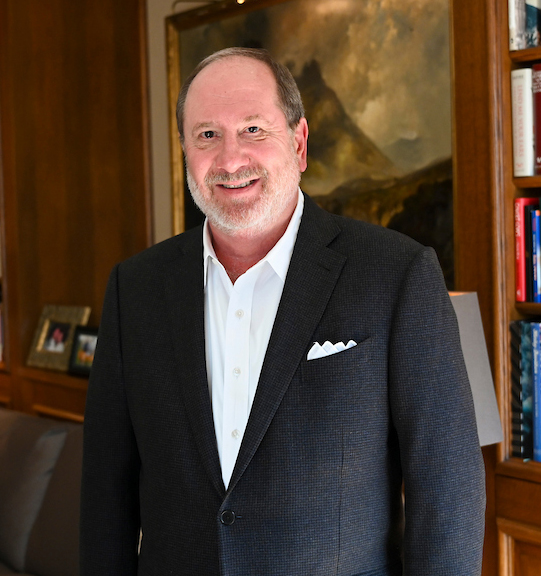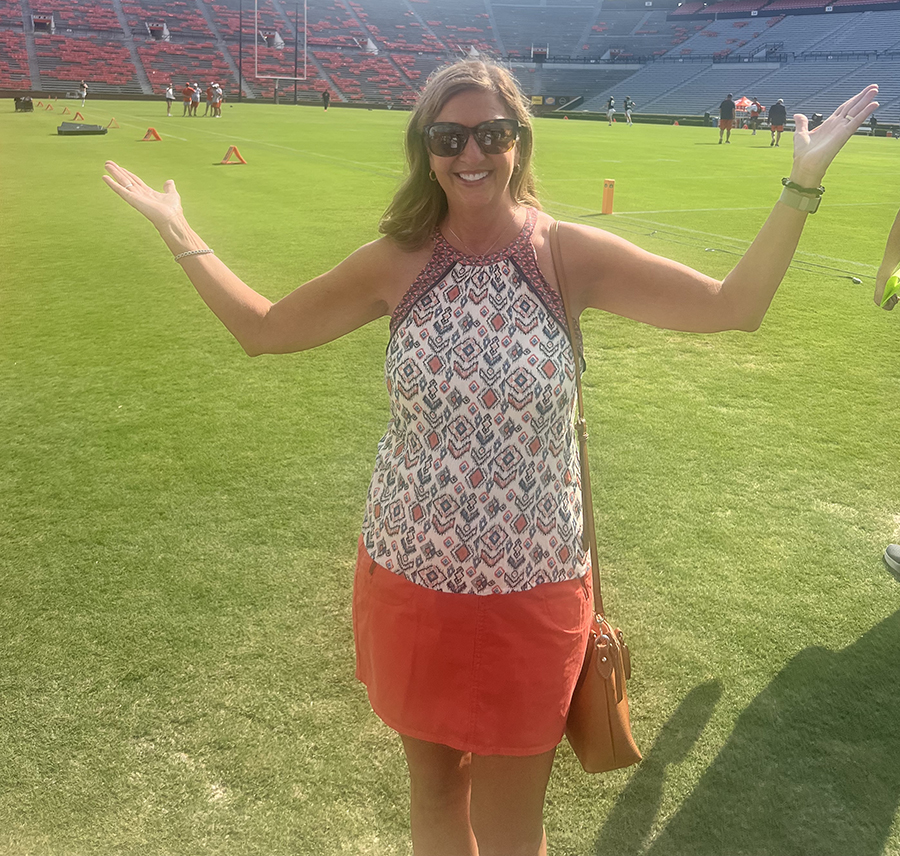A snarling, ornery black bear stands to your left. Nearly eight feet tall, with claws ready to slice and dice. A grizzly lurks to your right, and he looks mad, too.
A mountain lion crouches near your feet, while three giant moose stare down from the
rafters. Beside them, you’ll find large bucks, wild buffalo, antelope, a zebra, hyenas,
and even a gigantic Western diamondback rattlesnake crawling the walls.
Don’t worry, they’re not real. The dozens of mounted wild game that inhabit Summerfield
– a 2,000-acre farm nestled in the wooded foothills of Chilton County – might no longer
be the living, breathing real deal, but their host – Dan Moultrie – thrives on authenticity.
 Moultrie, a 1979 Harbert College alumnus who has hunted wild game worldwide, is founder of successful Moultrie Feeders, a product line found at most large outdoor retailers, including Academy Sports,
Cabela’s, and Walmart.
Moultrie, a 1979 Harbert College alumnus who has hunted wild game worldwide, is founder of successful Moultrie Feeders, a product line found at most large outdoor retailers, including Academy Sports,
Cabela’s, and Walmart.
Moultrie has negotiated deals between corporate giants, state governors and helped
pass state legislation. He’s a successful veteran businessman without a fancy suit
or 34 th -floor office. He drives a pickup truck, comfortably wears his camouflage Moultrie
ball cap, and can probably catch a string of crappie before some folks can bait a
hook. His word is gold and he believes the best way to cultivate and retain business
is the good, old-fashioned way – through trust and relationships.
“One of my mother’s south Georgia-isms, as I call them, is ‘your deeds will find you
out, good or bad,’” he said. “If your company doesn’t take care of its customers, it will find you out. Companies that don’t take care of their customers
… shame on them!”
How does Moultrie take care of its customers? It begins with establishing trust. Moultrie
offers two-year warranties on his feeders, which help ring the “dinner bell” for wild
game, and other products. But it doesn’t end there. “Really and truly, our two-year
warranty is lifetime,” Moultrie explained. “If anybody ever has a problem with their
product, we’ll take care of it. We either fix it or replace it. That’s the way we extend
customer satisfaction and build that relationship with folks. We want to make sure
that they are happy. That’s the way it ought to be done.”
Moultrie, who credits Pat Dye for teaching him about building relationships, believes
that extending that relationship to his customers, whether they are large retailers
or individuals, maintains that customer base -- just as his feeders hold wildlife to a specific property. Feeders range in size, shapes
and coverage areas. The object is to maintain wildlife population to a specific area,
either for hunting or viewing enjoyment.
Moultrie, former chair of the Alabama Conservation Advisory Board, said the idea for the feeder
grew out of frustration on the family farm in west Georgia. “We bordered the Callaway
Gardens property,” he explained. “Every year, Mrs. Callaway would grow crops and the
deer would leave en masse and go to their property.”
What happened next with a napkin, a pen and prototype sketching during the Christmas holidays changed game management history. “My brother owned a
company out of Atlanta that designed electronics,” Moultrie said. “We took that napkin
and drew a schematic of it (feeder) and said, ‘We’ll build 10. This is the absolute
gospel truth about how the company got started.”
Moultrie rushed to town to get parts necessary to build his first feeder, ran into
a few hunting buddies and shared his plans. “Every one of them said, ‘If you’re going to build 10,
build me 10 more.’ I thought, ‘I might be on to something here.’”
That was the late 1970s. Today, his feeders and outdoor cameras are the most popular
brand on Earth, and he attributes much of his success to his core values. “You’d better do
what you say and provide more back than you gave somebody,” he said. “If you did that,
the business seemed to be unstoppable.
Photo credit: Patrick McGough, Vestavia Hills Magazine

 Degrees & Programs
Degrees & Programs
 Faculty & Staff
Faculty & Staff
 Career Development
Career Development
 Recruiters & Industry
Recruiters & Industry
 Moultrie
Moultrie

